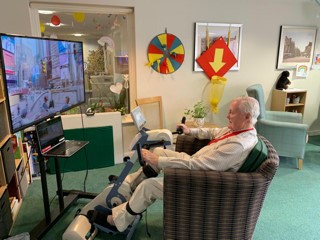In the UK, 850,000 people currently live with dementia but this is set to reach 1.6 million people by 2040 due to the ageing population.
For many, the cost of providing care for their loved ones diagnosed with dementia is significant and can be a struggle. According to Alzheimer’s Society, the total cost of dementia care in the UK is currently at £34.7billion.
With this set to nearly triple over the next two decades, it’s never been more important for people to consider a more preventative approach to dementia. This will improve the quality of life of individuals living with dementia, help take the strain off health and social care services, and also support a delay in the onset of the syndrome.
Bernadette Mossman, Healthcare Director at dementia care specialist Vida Healthcare, discusses activities which can help slow the dementia process and why people should incorporate these into their daily lives as early as possible.
“Dementia affects everyone differently, so there’s no one-size-fits all tool which will help to slow the process; what works for one individual might not work for another.
“However there are things we know we can do which will support healthy brain function and stimulate the most complex organ in the body. As with any muscle, if it’s not used and challenged regularly its full benefit won’t be tapped into.”
Increase heart rate
“Exercise has long been known to benefit the human body in a huge range of ways. Taking regular physical exercise and enjoying a healthy, balanced diet is one of the best activities that can be introduced to reduce the risk of developing dementia.
“Several studies looking at the effect of aerobic exercise have reported improvements in thinking and memory, and reduced rates of dementia4. Physical exercise is essential for maintaining adequate blood flow to the brain and may stimulate brain cell growth.
“However, this doesn’t mean taking part in marathons or extreme physical challenges is required. Individuals should choose activities they enjoy to make sure they develop into a routine, and this can be anything from swimming and hiking to yoga and tai chi.
“Exercise is also beneficial for people currently living with dementia, as it boosts mood, increases social interaction and helps to reduce health risks related to physical inactivity such as muscle wastage and joint issues.”
Introduce a routine
“For people already developing dementia, it can be difficult to understand what can help slow the process. Maintaining a routine which is already part of daily life can preserve independence and delay the process of declining memory.
“The person living with dementia needs to be supported so they can continue to be able to do normal daily activities of living to promote independence and maintain a familiar routine. This in turn will encourage them to attain and hold onto the information needed to continue performing everyday tasks. (for as long as they are able)
“As soon as a routine and independence is removed, a person developing dementia (living with dementia) will forget things that are taken for granted in everyday life and become increasingly dependent on loved ones and social care providers.”
Celebrate having a purpose
“Having a purpose and function is crucial for everyone as it gives people a place in society. Retired individuals, or the elderly can often feel as if they have no purpose and therefore surplus to the requirements of their loved ones and society as a whole.
“For example, if someone is used to playing golf, they should do activities around this as much as possible to ensure they feel normal to allow them to retain the skills they can still enjoy for as long as possible, and remember what they enjoy. Loved ones can also include the person living with dementia relatives in daily activities and ask them for help where possible to make them feel involved.
“This in turn will help slow down the dementia process as individuals will feel included, positive and remember their perceived purpose for longer, therefore creating opportunities for slowing down the process of cognitive decline.”
“Although it can be difficult to measure how activities slow down the dementia process as it’s so unique, it’s important that people support their health and wellbeing as early on as possible. Making sure to include physical exercise, develop a normal routine and remembering a perceived purpose is crucial as this will preserve an individual’s sense of ‘self’. People shouldn’t be afraid to focus on themselves, and loved ones should work together to help slow down the dementia process.”
For more information about the specialist care available for people living with dementia, please visit www.vidahealthcare.co.uk.

